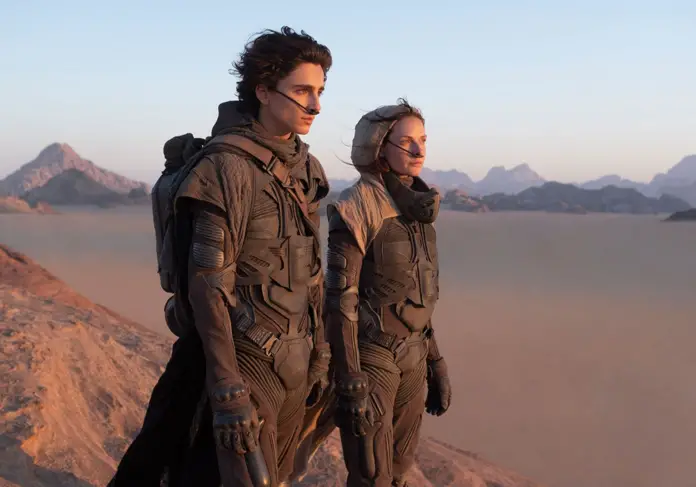Directed by Denis Villeneuve, the film Dune is based on a series of novels written by Frank Herbert in the 1965. It falls in the genre of sci-fi and adventure and has a total runtime of 2 hours and 35 minutes.
IMDB has rated it at 8.3/10. Packed with drama and stunning visuals, the films end is actually just a beginning of a new story and new ideas!
Released on October 21st, Dune quickly became the biggest hit by Warner Bros. Its sequel, Dune Part 2, is expected to be out in theatres on October 20 of 2023.
The protagonists Paul Atredias (Timothee Chalamet) and Jessica (Rebecca Ferguson) are mother and son. Paul is a brilliant and gifted young man who must travel to the most dangerous planet in the universe to protect his family legacy and his people. Paul is pitted against Arrakis, a desert world where the only thing more dangerous than the shifting sand is the backstabbing politics. Arrakis has spice, the only substance that acts as a fuel for space travel in the Dune universe.
Paul’s father is a duke teaching him to play cosmic realpolitik. His mother, Jessica is a super-powered space witch. Paul often dreams of a blue-eyed girl, a desert warrior (Zendaya) who just might be an inter-galactic messiah.
Wherein the beauty of the film lies in its monotony of the colours of black and grey, the lack of colours actually contributes to the mood and storyline of the film and the spectator does not miss the absence of a bright colour palette.
The dialogues are often hushed and spoken in whispers, making it difficult for the audience to comprehend what’s being said, as noted by the critics.
The most powerful and compelling character is that of Jessica, who plays a conflicting and dual role of an impassioned mother and a scheming zealot.
The main thematic concern of the film is the battle between good and evil, as in all sci-fi stories. However, the freshness of perspective and the beauty with which the film captures the desert environment is remarkable.
The themes of colonial oppression and ecological disaster are also potent themes, clearly manifested in the film. Arrakis is populated by the Fremen, a group of warriors and desert dwellers who have to fight against a series of imperial colonisers, each one using different methods of control to mine and sell spice.
From the ecological point of view, Villeneuve in Dune points to how fragile a planet’s ecosystem can be. It also highlights how we must change our dependence on extracting resources to start a planetary healing process.
As the film reels through, the audience is reminded of the 1991 film The Mummy, which was shot in Egypt. The conquest to end the reign of terror by a lurking evil within the pyramids of Egypt depicts a similarity between the two films. Both share the same surroundings and have analogous goals. Whilst in The Mummy the protagonist is out to destroy the evil mummy, in Dune it is again a battle of power between malevolent forces to get the spice, the most precious resource in existence.
The Mummy is an action-packed film whilst Dune is sci-fi. The Mummy is more realistic but Dune is more futuristic.
What lies at the heart of the film Dune is the concept that only those who will conquer their own fear will survive.
This idea is pivotal to the film and can be compared to J. K. Rowling’s Harry Potter series. Just like the Dementors, which feed on negativity and can only be triumphed over through happy thoughts, in Dune too, Paul has to take the pain and torment without failing in order to live.
On the whole, a tremendous effort on behalf of the director. Dune served as a gateway to reopening of the cinemas and hyped up the audience after a good 2.5 years of the cinemas being shut!







